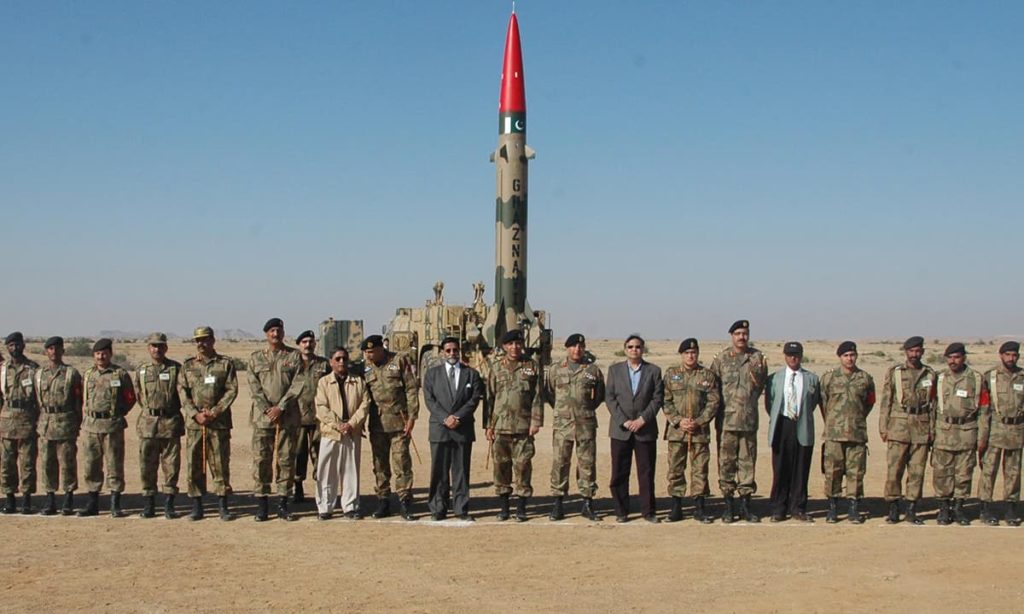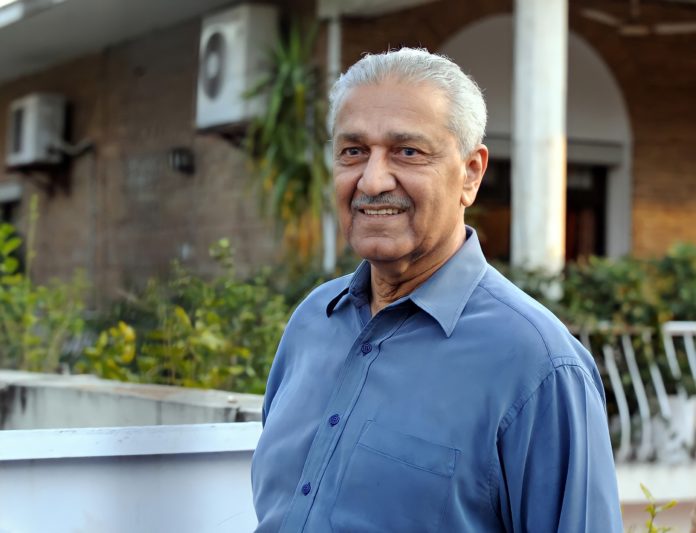Dear Readers,
Pakistan’s leading atomic scientist Dr. Abdul Qadeer Khan (popularly known as AQ Khan) passed away in Islamabad at age 85, on Sunday October 10 after a protracted illness. Widely regarded as the founder of gas-centrifuge enrichment technology for Pakistan’s nuclear deterrent program, he is hailed as an icon, a national hero for transforming Pakistan into the world’s first Islamic nuclear power in the face of its four-times bigger predatory nation, India.
When India set off a nuclear bomb in the desert of Rajasthan in 1974 describing it laughably as a “peaceful nuclear explosion”, this set off a series of events that culminated in Pakistan acquiring its nuclear status. A young Pakistani metallurgist working in the Netherlands at that time saw the Indian nuclear explosion as a potential threat to Pakistan and volunteered his services to his country. A few months later, Abdul Qadeer Khan was sitting down with the then-Prime Minister, Zulfiqar Ali Bhutto, explaining the possibilities of spinning uranium in centrifuges to make it usable in bombs. Bhutto was suitably impressed and quite pleased, “this man makes sense” he said. Much later AQ Khan was instrumental in setting up Pakistan’s first nuclear enrichment plant at Kahuta near Islamabad. On May 11 and 13 India announced two sets of nuclear tests, spurning the international non-proliferation regime, and the global norm against nuclear testing embodied in the Comprehensive Test Ban Treaty (CTBT). This prompted Pakistan to announce its own tests on May 28 and 30, 1998, AQ Khan who headed Pakistan’s nuclear programme confirmed that one device tested was in the 30- to 35-kiloton range.
AQ Khan’s efforts transformed him a national hero in Pakistan, one who made invaluable contributions in the fight to protect Pakistan from its gigantic neighbour, India allowing it to stand tall and free on the international stage. Unfortunately, he carried a mixed bag of acclaims and controversies, the West regarded him as a villain and a dangerous renegade for varying reasons, someone who was responsible for smuggling technology to those considered ‘rogue states’ by the West. However, coming shortly after similar tests by India, Dr. Khan’s work helped seal Pakistan’s place as the world’s seventh nuclear power and sparked national jubilation.
Born in Bhopal, India in 1936, AQ Khan immigrated with his family to Pakistan in 1947 after partition of the sub-continent. Studying initially at St. Anthony’s High School, he joined the D. J. Science College in Karachi studying physics and mathematics. One of his teachers at the college was the famous solar physicist Dr. Bashir Syed. Khan earned a B.Sc. degree in physical metallurgy at the University of Karachi in 1960. He then accepted a job as an inspector of weight and measures in Karachi after graduation but resigned and went to work in Netherlands in the 1970s. He gained fame as a talented scientist at the nuclear plant he worked in, having special access to the most restricted areas of the URENCO facility. He was also able to read the secret documentation on the gas centrifuge technology.
Fearful that India’s new nuclear capabilities would give it an insuperable advantage in the competition with Pakistan, Khan endeavored to secure the same for his own government. He later said that he remembered how India had supported separatists who split his country in two, with East Pakistan becoming Bangladesh and “I wanted that what happened in 1971 should never be repeated again.” He acquired designs for nuclear centrifuges from his Dutch employer so that Pakistan could enrich uranium to build its own bomb. Years later, he explained that after the 1974 tests, “I felt that Pakistan’s security is in danger.”
Khan returned to Pakistan in 1975 to set up the country’s first nuclear facility, later named the Dr. A.Q. Khan Research Laboratories. From his perch as director and chief scientist, he is reputed to have directed Pakistan’s nuclear weapons development program, an effort that culminated in its first nuclear tests in 1998, just after India conducted its own nuclear tests. For that work, he was, tweeted Pakistan’s current prime minister, Imran Khan, “loved by our nation (because) of his critical contribution in making us a nuclear weapon state.” Providing security against “an aggressive much larger nuclear neighbor,” Prime Minister Khan continued, made the scientist “a national icon.”

After his role in Pakistan’s nuclear program, Khan re-organized the Pakistani’s national space agency, SUPARCO. In the late of 1990s, he played an important role in Pakistan’s space program, particularly the Pakistan’s first Polar Satellite Launch Vehicle (PSLV) project and the Satellite Launch Vehicle (SLV). However, Khan’s unrestricted publicity of Pakistan’s nuclear weapons and ballistic missile capabilities brought problems to the Pakistan’s government. The United States began to think that Pakistan was giving nuclear weapons technology to North Korea to get ballistic missile technology in exchange. Khan also came under renewed scrutiny following the September 11, 2001 attacks in the U.S. He allegedly sold nuclear technology to Iran. In 2004, AQ Khan was allegedly at the Centre of a massive global nuclear proliferation scandal and in a series of dramatic developments, under severe pressure from the US, he was accused by the then Army Chief and President Pervez Musharraf of running a rogue proliferation network for nuclear material. Shortly afterwards, a recorded confession by Khan was aired on national Television in which he took sole responsibility for all the nuclear proliferation that had been revealed. He was subsequently pardoned but placed under house arrest. On August 22, 2006 the Government of Pakistan declared that Khan had been diagnosed with prostate cancer and was undergoing treatment. In 2009 he was released from house arrest.
However many parts of the entire sordid episode are contested with some Pakistani scientists insisting that Khan was a mere cog in a larger program, and his prominence reflects Khan’s public relations abilities rather than his technical skills. Khan himself recanted parts of his 2004 confession, denying any involvement in nuclear smuggling and said that everything he did had official government sanction. In his telling, he was no rogue actor who acted for personal motives.
Apart from his achievements in the nuclear field, AQ Khan was also a key figure in the establishment of several engineering universities in Pakistan. He set up a metallurgy and material science institute in the Ghulam Ishaq Khan Institute of Engineering Sciences and Technology. The place, where Khan served as both executive member and director, has been named as Dr. A. Q. Khan Department of Metallurgical Engineering and Material Sciences. Another school, Dr. A. Q. Khan Institute of Biotechnology and Genetic Engineering at Karachi University has also been named in his honor. Khan thus played a vital role in bringing metallurgical engineering courses to various universities of Pakistan.

Despite his binary international image, AQ Khan still remains a widely revered figure within Pakistan, considered domestically to be one of the most-influential and respected scientists who helped build his country’s defences against India.
As soon as the news of his death broke on national and international media, tributes poured. Pakistani President Arif Alvi, Prime Minister Imran Khan, Foreign Minister Shah Mahmood Qureshi, Defense Minister Pervez Khattak, Army Chief Gen. Qamar Javed Bajwa and other Cabinet members as well as top politicians expressed grief over his demise and called his death “a big loss” for the country.
“The opinions/views expressed in Defence Journal are entirely those of the writers and cannot be construed to reflect the official views of Defence Journal”.




